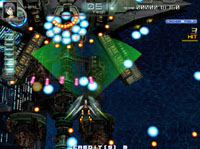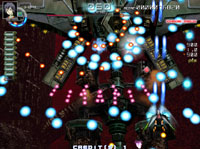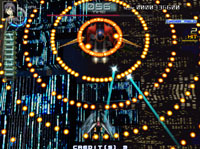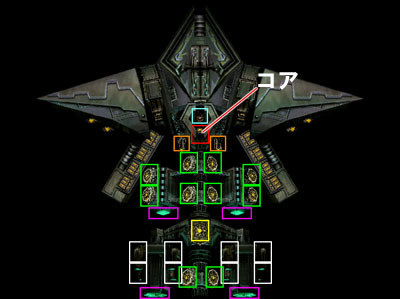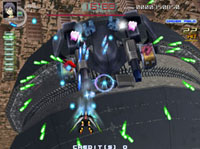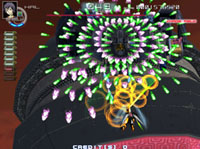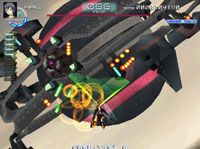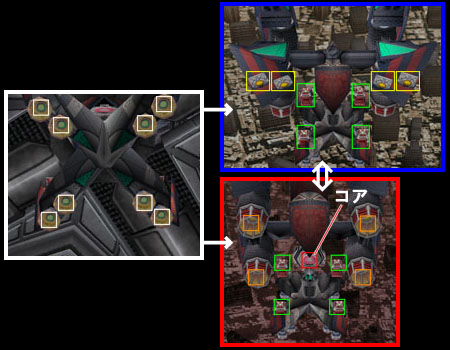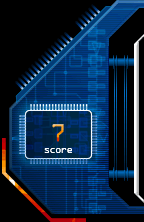A
BRIEF INTRO
Chaos
Field is not an "original" game: it basically puts together
many elements from various shmups and puts them together. This is
typical, after all, of doujin ("Amateur", i think) shmups,
and by no means a bad thing, mind you. Some sources of inspirations
are obvious (RSG and Ikaruga), others are a bit more obscure (a
few Taito games, Sokyugurentai). In the past, one company started
by making a sort of "homage" to a few titles by Toaplan:
Seibu Kaihatsu and their Raiden. Raiden then became a complete and
original series, also spawning another trilogy (the Raiden Fighters
games). Chaos Field, on the other hand, may not be up to its sources
of inspiration, but let's see why.
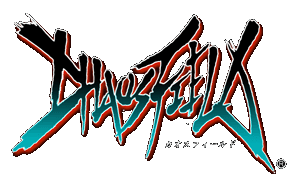
GFX:
6--
If
you want good graphics from your game, you can stop reading here
and spend your money on something else. The basic problem with the
game is its rough aspect. All enemies and backgrounds are more or
less rough, in the sense that they simply lack a decent number of
polygons. This feature is to be clearly seen in specific points
like the second stage, where you confront a giant black planet...
which is more like a polygon with a lot of angles. The DC/Naomi
may not be the newest hardware around, but others games have a quite
higher definition in the objects they display.
The
backgrounds are also pretty simple, basically lacking any relevant
details. However, some backgrounds are not bad, especially in their
"settings": the first stage is set on a metropolis, at
night, and has its own appeal... Shame that the final part of the
stage shows all the limits of the game, with a sort of nuclear reactor
in the background, which is an indefinite mix of various stylistic
elements. Other parts, however, are better: for instance, third
and fourth stages are set in space, with the earth and the stars
appearing in the background.Shame they look pretty bland, for the
aforementioned reasons. What's really doujin-like, though, is the
pretty obvious rip-off of various bosses from other games: references
and homages have appeared in all shmups, but in this case, the programmers
simply re-coloured bosses from other games and put them as enemies.
You can actually test your shmup knowledge by finding out which
bosses have been ripped off from other games, and which ones...final
note: the three pilots have a generic, "alternative" look,
not to mention that the various cut-scenes are pretty bland.
SUMMARY
OF SUBSECTION
In
short: The game is barely decent, graphically speaking, even if
it has some good ideas.
BGM:
10
Easily
the best part of the game. The BackGround Music of this game is
basically dance/techno stuff: if you don't like this genre (i don't,
more or less), you may probably hate it. However, the two authors
(Kou Hayashi and Daisuke Nagata, who also worked on Zanac Neo) have
been extremely successful in producing a very interesting and original
(for its genre) soundtrack.
Basically,
all songs can be ascribed to one dance subgenre: unlike most dance
songs, however, they don't are a simple loop repeated for just a
few seconds. All themes are pretty elaborate and they evolve over
their duration, like they slowly switch to a slightly different
song: this is based on gameplay,probably, as the songs' variations
roughly correspond the different phases of a stage. The most beatiful
song is probably "Human Figure", a trancey lullaby, similar
in style to the 808 stage songs, which has a nice final part, elaborating
the two principal lines in one final theme. Very nice, too, are
"Spinout " and " Back to the machine" (4th and
5th stage respectively), the former being a sort of old skool break-beat
song ( à la Marrs, or other '80s bands), the latter being
pure Eurobeat techno!. The boss theme, instead, sounds like a darker,
vaguely "Nine Inch Nails-like" song, while the first two
stages songs ("Not back in time" and "Coccus")
are more on the "club/house" side.At any case, they easily
are excellent and very complex songs, something very unusual, especially
for VideoGame Music.
SUMMARY
OF SUBSECTION:
Excellent
soundtrack, if you don't like Dance/Techno it's not your cup of
tea, but it's quite better than most of the average songs for said
genres.
GAMEPLAY:
7.5
This
vote could have been higher, if not for a couple of flaws in the
game mechanics. But let's proceed in order. You play with three
buttons: A is normal fire (tap or hold down for a continuous
stream of bullets), B is the sword (tap once for one swing,
tap twice for the second swing, tap three times for the third swing
with both swords), C is the change field function.
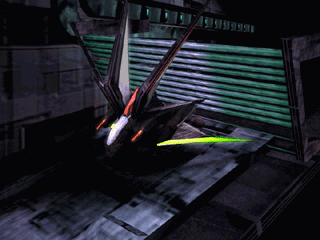
While
the main attack is straightforward, the other two require some explanation.
The sword can cancel bullets and deal damage to enemies. It can't
cancel all bullets, though: homing laser s and purple,arrow-shaped
bullets can't be cancelled. If you tap three times, the ship will
use the left sword, then the right, then both swords: then, it will
need half a second to recover. Be careful,then, as this means that
you must dodge what you can't cancel. the change field function
is an original an interesting idea: you basically can switch between
order and chaos field, this meaning that you can choose between
a more sedate variant of a stage (less attacks), where you get more
meta-cubes and thus also more golden cubes by destroying stuff.
Your attacks are however weaker...if you switch to chaos field,
your attacks will be stronger, you will get less meta-cubes by blowing
up enemies, which also are more aggressive (extra attacks and parts).
You
will be immune to all bullets during the change, and they will also
disappear...but you need at least 5 seconds to do a change. Now,
what are meta-cubes? You have a special attack stock on your left,
made of 10 bars: every special attack uses one bar.If you don't
shoot and move,they will automatically be siphoned to your ship.If
you max out the bars, every extra meta-cube (golden in appearance)
will be worth 10k. Special attacks are used by pressing together
A+B or B+C: the former combination releases a shield, the latter
a salvo of homing lasers (your ship will scan an arc in front of
it to lock-on enemies and bullets).Both special attacks will start
a combo, based on the amount of cancelled bullets (you have up to
5 seconds to continue the combo, as shown as the time on the right:
it's important to lock-on bullets, and not actually hit them, if
you use the homing lasers attack, regarding the combo).
The
amount of hits you place is divided by ten and then used as a multiplier
for destroyed enemies' points (if you destroy parts of the enemies
or the enemies themselves, of course). Let's make an example: you
destroy with your final hit the first boss, doing a combo of 988
hits. 988 divided by 10 is 99,8: the boss value is 25k points. You
have then:
25kx99,8=
2,495M
And
you also get 10k points for every remaining second (all fights are
timed). Interesting note: if you're too fast in destroying a boss
(depends on the single boss), their basic value will be just 1k!
Now, the flaws: The lock-on weapon can really slowdown things, when
locking the maximum amount of targets (100 for Hal, for instance).
Slowdown
seems intentional, in the sense that the ship still goes at the
same speed...but the game really slowdowns completely, and this
can be difficult to handle. In many sections, it seems like they
decide not to correct the issue, as the better choice is the shield,
not the lock-on (for combo purposes). Not only that, but you also
get frame-skipping on some attacks. Aside that, characters are a
bit unbalanced: Hal (mixed blue ship) is the character of choice,
as many attacks are easier to combo with his shield.Ifumi (flawed
red ship) seems to be too weak, While Jinn (fake yellow ship) has
slow movement, close-range basic attack and difficult to use special
attacks. Finally, the game has five stages, which are divided in
three boss fights each: yes, it's just one giant boss fight, and
it's actually more or less challenging,something "new"
in these recent times.
SUMMARY
OF SUBSECTION:
Gameplay
is good but flawed in some aspects, some things are original and
others are just follow the latest trends. It's one giant boss battle,
with three bosses per stage: One character is obviously stronger,
and the slowdown can be annoying in some cases, in some parts you
get some frame-skipping issues.
LONGEVITY:
7-
The
game offers a somewhat decent challenge, as it's not extremely easy,
like some recent titles. The trick to play well the game is balancing
order and chaos sections, by getting a full meta stock in order
and then switching to chaos, since you're more powerful. Comboing
bosses is at the same time score-rewarding and a good way to survive
(you cancel most of the bullets), but sometimes it's difficult to
see what's going on. Like other titles, also, the differences between
the various characters are a bit too exagerated: As i said, Hal
is quite adanvantaged in many points, especially for its shield.
The port itself is also pretty plain: it even lacks a score-saving
feature!
The
basic problem with the game is fundamentally its doujin-like nature:
it's not a bad thing, but the authors crammed too many homages and
things they wanted to put together, without making something truly
original (aside the field mechanic). Still, the stage layout, while
focused on Hal (other bad thing) and its attacks, is pretty brilliant.
All in all, it's an interesting game, even if it fails to a completely
unique and personal style. You will probably won't play it for ages,
but it's an interesting first game...i hope Milestone will do something
more original, next time.
SUMMARY
OF SUBSECTION AND FINAL REMARKS:
The
game has interesting ideas, but also a lot of plain homages to other
games. It has a great Soundtrack and is more or less challenging,
but it has some slowdown issues and it's unbalanced in ships selection.
The port hasn't any extra features, too. What's original of the
game is brilliant, but other aspects are a bit too much of a copy.
All in all, a decent game, but it could have been better.
FINAL
VOTE: 7






